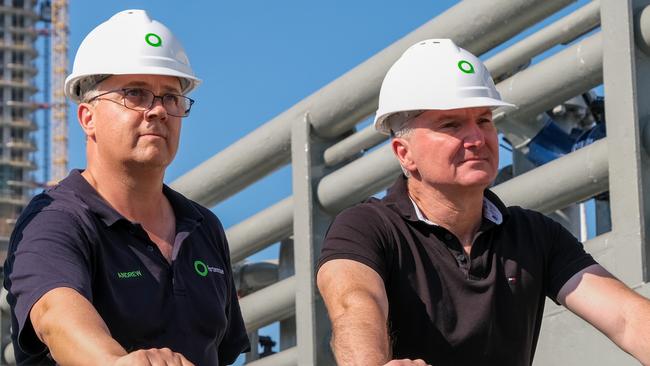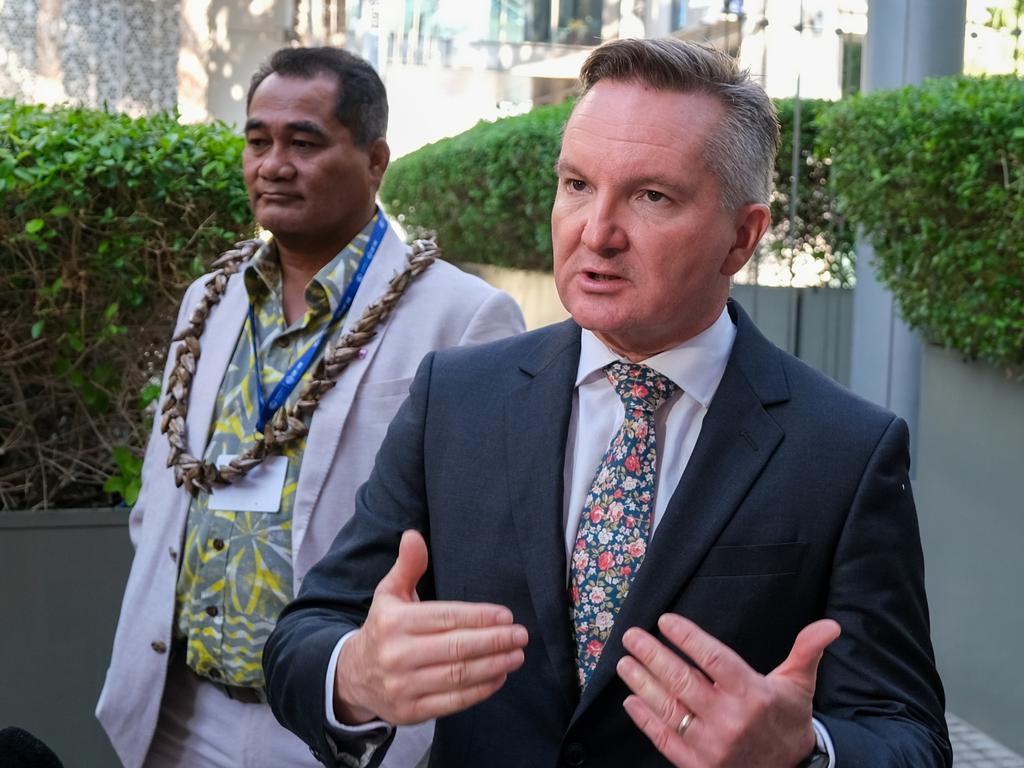Business calls for clarity as Chris Bowen pushes for an end to fossil fuels in energy systems at COP28
Chris Bowen wants COP28 to agree to an end to unabated fossil fuels in energy grids, raising concerns among business groups.

Chris Bowen has declared the Albanese government won’t need to change its suite of climate targets and policies as he calls for an end to the use of unabated fossil fuels in energy grids, triggering warnings from business that jumping to renewables too quickly would be “calamitous”.
As countries at the COP28 UN climate conference struggled to reach a consensus on fossil fuels, with a draft text due to be released on Monday night, Mr Bowen addressed an emergency meeting pushing for a “very strong outcome”. He stressed emissions must peak by 2025 and reduce by 43 per cent by 2030 and 60 per cent by 2035 in order to limit global warming to the previously agreed upper limit of 1.5C.
“If we are to keep 1.5C alive, fossil fuels have no ongoing role to play in our energy systems, and I speak as the Climate and Energy Minister of one of the world’s largest fossil fuel exporters,” Mr Bowen said. “We embrace that fact and acknowledge it because we also live in the Pacific and we are not going to see our brothers and sisters inundated and their countries swallowed by the seas.
“We don’t need to phase out fossil fuel emissions. We need to end the use of fossil fuels in our energy systems, with abatement as a backstop and goalkeeper, not an excuse for delay or inaction.”
Climate groups said Mr Bowen’s language was promising but did not go far enough, as they demand an entire phasing-out of fossil fuels, while business questioned the impact on industry by ending the use of unabated fossil fuels in energy systems.
“We would expect there will be some level of residual fossil fuels use for the foreseeable future, even out to 2050,” Australian Chamber of Commerce and Industry chief executive Andrew McKellar said.
“The government’s commitment is to net-zero emissions within that time frame, not to absolute zero. We would be concerned to clarify whether these statements (from Mr Bowen) are consistent with existing targets or whether something new or different is envisaged. Business is looking for the highest level of certainty that it can get.”
Australian Industry Group chief executive Innes Willox said industry supported the transition to a low-emissions future, but it must allow business to adapt to technological change, find the skilled workforce, and continue to produce to its strengths.
“There is no doubt fossil fuels will play a reduced role in our future but we can’t just jump from fossils to a wholly renewable economy overnight. The consequences of pushing too hard, too fast would be calamitous,” he said.
“As industry and households adapt, there must be the certainty through the provision of baseload power that the lights will stay on and production can continue uninterrupted.”
Mr Bowen said Australia’s support for the end of unabated fossil fuels in energy systems was also backed by the world’s largest producer of oil and key ally, the US.
The position helped return Australia – which is prioritising the use of renewables, storage and flexible gas – to a place of being a “respected, constructive leader”, Mr Bowen said, adding the government would not need to change policy if the unabated fossil fuel text was globally adopted.
“We’ve engaged in very good faith knowing there are countries that, respectfully I say, have a different view. Saudi Arabia, for example,” he said. “We came to this COP with the G7 having agreed to a phase-out of unabated fossil fuels in energy systems by 2050 – a position that the umbrella group decided to support, which I chair obviously, at the beginning of these negotiations.”
The umbrella group includes the US, UK, New Zealand, Canada, Japan, Israel, Ukraine, Kazakhstan, Iceland, and Norway.
Climate Council senior researcher Wesley Morgan said Mr Bowen was right to assert fossil fuels had no ongoing role to play in energy systems, with the necessary technologies to replace fossil fuels for electricity generation and transport.
“We have our hand up to host COP31 with Pacific Island countries and if we’re going to host the global climate talks, we need to be supporting the Pacific’s fight for survival and that means getting behind a phase-out of fossil fuels at COP28,” Dr Morgan said.







To join the conversation, please log in. Don't have an account? Register
Join the conversation, you are commenting as Logout